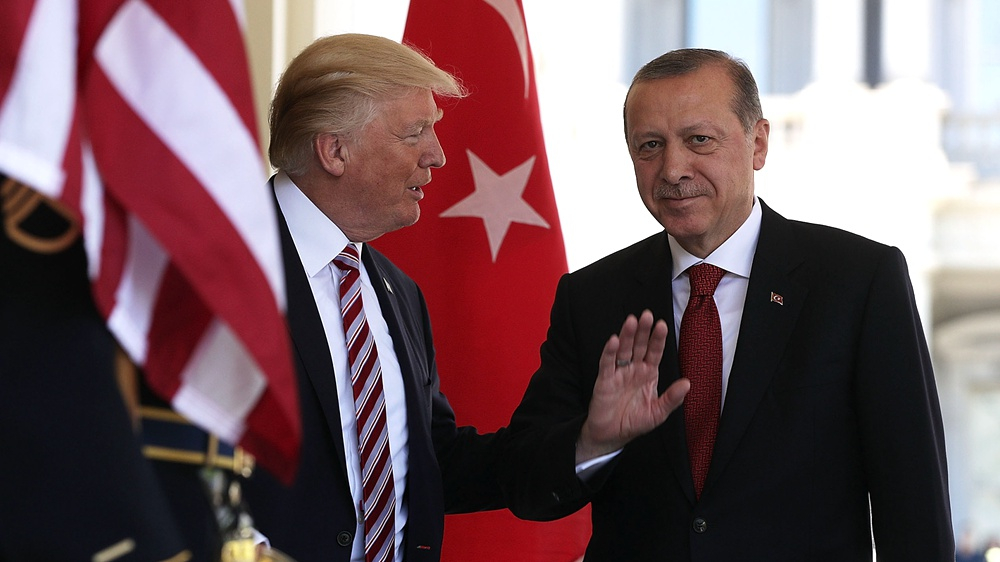
Photo: AP
The presidents of Russia, Turkey and Iran – three countries hit by US sanctions – will meet in Iran on September 7 to discuss the peace process in Syria, without Washington's presence.
The United States, Russia, Turkey and Iran are the most important foreign powers involved in the over seven-year-long Syrian conflict, during which both Washington and Ankara used to support opposition forces fighting against the Syrian government led by President Bashar al-Assad. In November 2015, Turkey shot down a warplane of Russia, which entered the war earlier that year to help the retreating government forces. Though not without different agendas, the US and Turkey shared more common ground as NATO allies than Ankara with its traditional rival Moscow.
But that is not the case now. Thanks to the ongoing tensions between Ankara and Washington over the detention of American pastor Andrew Brunson in Turkey, Turkish President Recep Tayyip Erdogan is getting closer to Russia and Iran in an effort to seek "new friends and allies." Some analysts say Moscow, Ankara and Tehran are probably hoping to determine the future of Syria without the involvement of Washington.
Situation on the ground
Assad's forces have regained much of their lost land with the support of Russia and Iran. Now Damascus seems ready to launch a large-scale offensive against Turkish-backed rebels in the northwestern province of Idlib, the last major rebel stronghold in Syria. The situation in Idlib is expected to be on the agenda of the trilateral summit.
As Ankara coordinates stances with Moscow and Tehran, its ties with Washington have been strained by their conflicting goals in Syria since the beginning of the year. In northern Syria, Turkey has been seeking to expel the US-trained Kurdish forces (YPG), seeing them as allies of the outlawed Kurdistan Workers' Party (PKK). In January, Turkey launched cross-border attacks on YPG-held Afrin in northwestern Syria and took the region in March.
Despite the widening rifts, the US and Turkey are still working together on one front – fighting the remaining ISIL militants in eastern Syria.
"Our military-to-military relationship [with Turkey] is something that we remain committed to," Col. Rob Manning, a Pentagon spokesman, said earlier in August, noting that joint US-Turkish operations in the northern Syrian town of Manbij to avoid a direct confrontation are still on track.
Turkey's balancing act?
The September 7 meeting is not the first Russia-Turkey-Iran summit on the Syrian conflict. In April, Erdogan met with his Russian and Iranian counterparts Vladimir Putin and Hassan Rouhani in Ankara over Syria's future. Ankara, Moscow and Tehran are backing peace talks based in Kazakh capital Astana which they insist are aimed at reinforcing, rather than undermining, a United Nations peace process in Geneva.
Though the Astana mechanism has yet to achieve sustainable results, some observers believe the three countries involved are trying to sideline the US in Syria's peace process.
The US has about 2,000 troops in Syria, who train, advise, and assist forces that fight ISIL. With ISIL seriously weakened, the role of the US troops is diminishing.
"The White House has largely washed its hands of Syria," Chris Meserole, a Middle East expert at the Brookings Institution, told Newsweek.
"Power abhors a vacuum, and in the absence of strong US leadership on Syria, Russia and Iran have been more than happy to move in. It's a measure of just how much they've come to dominate the conflict that they'll be the only major foreign powers at the summit," he said.
Meanwhile, Erdogan is "shifting the nation's foreign policy to a more aggressive stance in order to allow Turkey to emerge as a regional leader," according to Harrison Akins, a Middle East security expert at the Howard Baker Center.
"As the US condemns Erdogan's move towards authoritarian control, further straining the US-Turkey relations, Erdogan appears to be putting himself in a position to form alternative alliances that will give him a freer hand in pursuing his interests in both foreign and domestic politics," Akins added.
Russia, Turkey and Iran appear to be "working for a future arrangement in Syria" without the "increasingly unpredictable US under the Trump administration," he told Newsweek.
But Zeynep Bilginsoy, an Istanbul-based freelance journalist, suggested that Erdogan could be engaging in a "balancing act," rather than seeking a new alliance with Russia.
"Switching partners is becoming a familiar dance for Turkey, which is strategically situated between Asia and Europe and often caught in the geopolitical push and pull of the turbulent Mideast region," she wrote in a report for the Associated Press.
In Turkey's view, "the US has become even more threatening than Russia" because of the current row, said Sener Akturk, an associate professor of international relations at Koc University in Istanbul.
The perceived threat makes the US "an ally that has to be paradoxically kept at arm's length and even balanced against with Russian cooperation," Bilginsoy wrote.
However, Aaron Stein, a senior fellow at the US-based Atlantic Council, warned that Russia holds the upper hand in its cooperation with Turkey. Moscow could use the reconciliation to have Turkey bring the rebels under the Syrian government's control, he said.
Given the complicated situation on the ground and the negotiation table, it is still too early to tell who will emerge as the biggest winner in Syria's peace process and who are on their way out.


